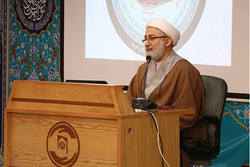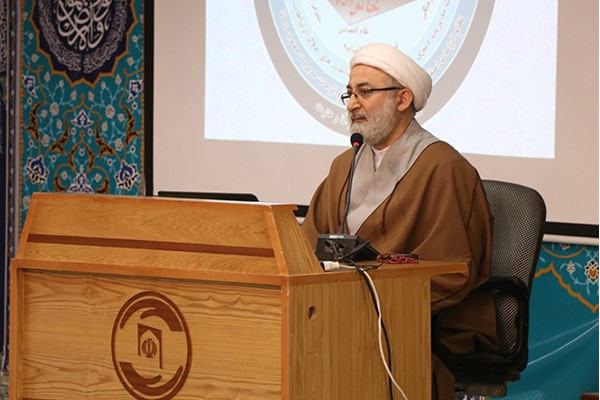Scholar Stresses Attention to Comprehensiveness of Quran


Hojat-ol-Islam Valliollah Naqipourfar spoke at a recent seminar on having a comprehensive view to the Quran in Fiqh, excerpts of which are as follows:
A survey of Fiqh books shows us that there is a lack of the principle of “comprehensiveness of the Quran” in the principles of deduction while paying attention to it is a necessity of the time. The ground for this issue is centrality of the Quran in Islamic thought and the basis of the discussion is having a comprehensive view of the Quran.
The first feature of centrality of the Quran is the principle of non-synonymity. What does it mean? For example in Surah Al-Fatihah we read: “Ihdina As-Sirat al-Mustaqim (Guide us the Straight Path)”. Guidance is always accompanied with Ila (to) but not hear. There is a difference when guidance is accompanied with Ila and when it doesn’t.
Another example is “La Rayb Fih” and “La Shakka Fih”. Rayb has a characteristic that Shakk does not. Sometimes in translating the Quran such intricacies are neglected.
The next principle is the “principle of Tazmeen”. Tazmeen means two verbs having conjunction. For example in Surah Al-Baqarah (verse 31) we read: “He taught Adam (father of humans) the names all of them and then presented them to the angels”. The pronoun ‘them’ refers to names and this shows that those names are not concepts but have real subsistence.
Along with Tazmeen we have the principle of Takhaluf. What does it mean? In Surah Al-Fatihah when different groups are mentioned, some are referred to as being among “those upon whom You have favored,” and some as “those upon whom is the anger” and “the astray”. The opposite of “those upon whom You have favored,” is not mentioned. The characteristic that is opposite of anger is mercy and the opposite of going astray is being guided. Sometimes more than 20 characteristics are deduced from Takahluf while they have not been directly mentioned in the verse.
“Quran centrality” is a fundamental insight that should include all studies about the Quran. Without attention to its principles and rules, we could do injustice to the Quran. Sometimes we think we are committed to Quran centrality but we face challenges in comparing the verses and the reason is lack of proper insight.
All of the Quran, especially those of Qasas (stories) are for legal and jurisprudential deduction. A great door is opened for Faqihs from the Qasas verses. There are some 1,500 such verses n the Quran. Sciences such as management, politics and sociology can also benefit a lot from them.



